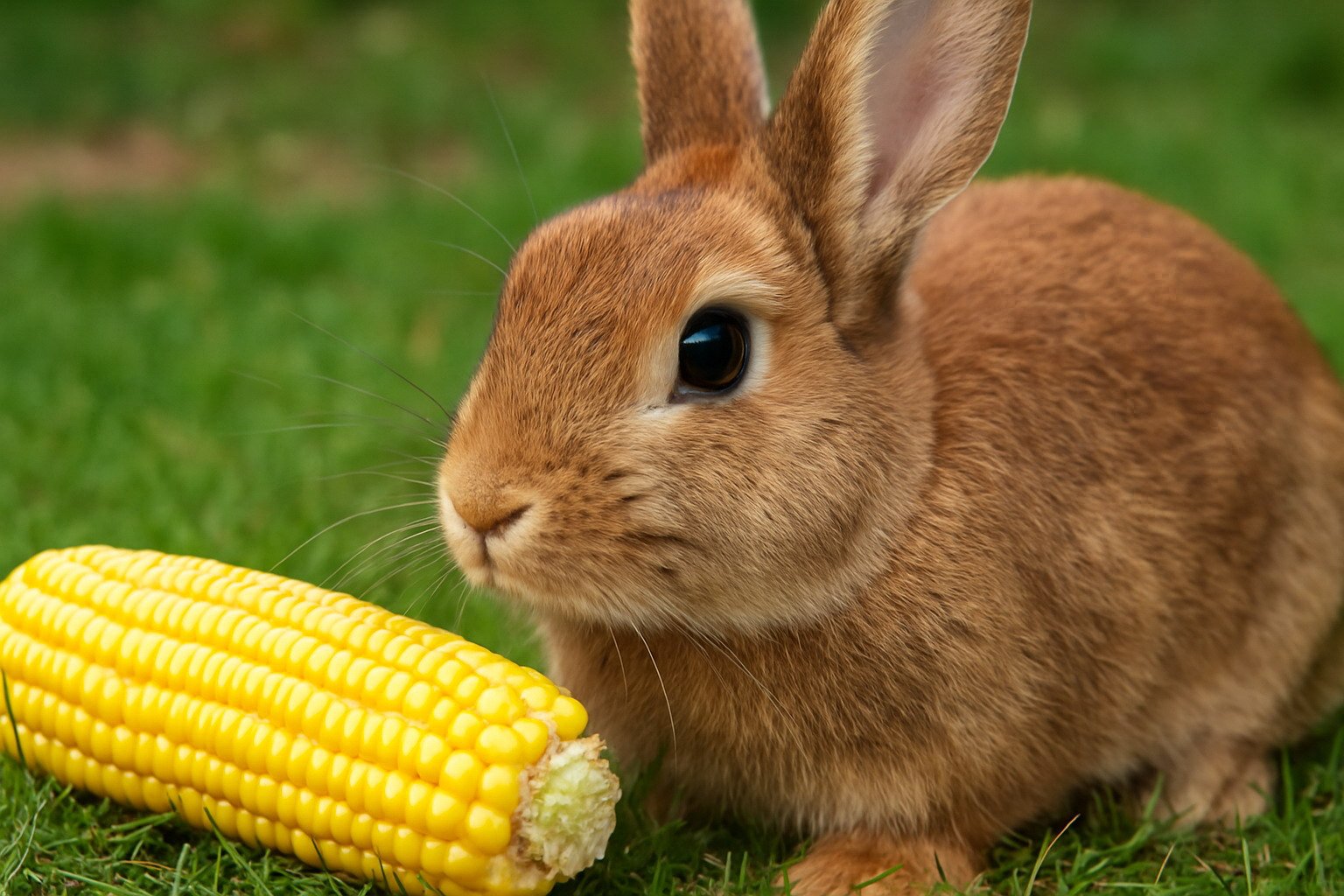Feeding your rabbit the wrong food—even unintentionally—can have serious consequences. With so many fruits, vegetables, and grains available, pet owners often wonder what’s safe and what’s not. One common question is: can rabbits eat corn on the cob?
In this article, we’ll dive deep into the answer, exploring the nutritional facts, risks, and safer alternatives for your bunny’s diet. Whether you’re a first-time rabbit parent or an experienced caretaker, understanding the truth behind this question is essential for your rabbit’s well-being.
Let’s break it all down.
In This Article
Understanding Rabbit Digestive Systems
Rabbits are obligate herbivores, which means their bodies are designed to process only plant-based foods—especially those high in fiber and low in starch. Their unique digestive system relies heavily on a constant flow of fibrous material, primarily from hay and leafy greens, to function properly.
How Their Digestion Works
- Rabbits are hindgut fermenters, meaning most digestion happens in the cecum, a pouch between the small and large intestines.
- Fiber passes through their digestive tract quickly and stimulates gut motility.
- Starches, fats, and sugars can disrupt this balance, leading to gastrointestinal stasis—a dangerous and potentially fatal condition.
“A rabbit’s digestive tract is a delicate balance machine. Too much starch or sugar can throw everything off.”
— Dr. Susan Brown, Exotic Animal Veterinarian
Why Fiber is Essential
| Nutrient | Role in Rabbit Digestion | Risk if Deficient |
| Fiber | Keeps gut moving, prevents hairballs | GI stasis, obesity |
| Protein | Supports muscle growth | Weakness, poor development |
| Starch/Sugar | Should be minimal | Bloating, diarrhea, dental disease |
When a rabbit consumes inappropriate food, their digestive bacteria may become unbalanced. This can result in bloating, pain, reduced appetite, or even death if not treated swiftly.
What Is Corn on the Cob?
To understand whether corn on the cob is safe for rabbits, it’s crucial to look at what it actually is and how it’s composed. Corn is a grain, not a vegetable—and while it may seem harmless, its makeup tells a different story.
Parts of Corn on the Cob
- Kernels: Soft or hard, depending on maturity; high in starch and sugar.
- Cob: The inner woody core; indigestible and poses a choking hazard.
- Husk: The leafy outer wrapping; fibrous and occasionally used for chewing.
Nutritional Breakdown of Corn (per 100g of raw kernels)
| Nutrient | Amount |
| Calories | 86 kcal |
| Carbohydrates | 19 g |
| Sugars | 6.3 g |
| Fiber | 2.7 g |
| Protein | 3.2 g |
| Fat | 1.2 g |
| Calcium | 2 mg |
| Vitamin A | 187 IU |
Corn is calorie-dense, high in sugar, and low in calcium and fiber—a poor match for a rabbit’s digestive needs.
Key Facts:
- Corn is not a leafy green or hay, and shouldn’t be treated as one.
- It’s a grain, typically used in livestock feed for weight gain—not suitable for pets that require high fiber and low energy foods.
- The cob portion is not digestible and offers zero nutritional value to rabbits.
Can Rabbits Eat Corn on the Cob?
No, rabbits should not eat corn on the cob. Despite being a common food item for humans and livestock, it poses several health risks to rabbits due to its nutritional composition and physical structure.
Why It’s Unsafe:
- Too Much Starch: Rabbits can’t efficiently digest high-starch foods. Corn’s carbohydrate content can disrupt the gut flora, leading to serious digestive issues.
- Choking Hazard: The hard cob and tough kernels can become lodged in the throat or digestive tract.
- Low Nutritional Value: Corn offers little to no nutritional benefit for rabbits compared to high-fiber leafy greens and hay.
- Can Lead to GI Stasis: An imbalance in gut bacteria from eating corn can result in a slowdown or complete stop in digestion.
Bottom line: While rabbits may nibble on corn if offered, it is not safe nor appropriate for their dietary needs.
Dangers of Feeding Corn to Rabbits
Feeding corn—especially on the cob—to your rabbit can lead to several health complications:
Health Risks to Be Aware Of
- Gastrointestinal Stasis (GI Stasis)
A life-threatening condition where the rabbit’s gut slows down or stops, often triggered by improper diet. - Bloating and Gas
Fermentation of sugars and starches leads to painful bloating. - Choking and Blockages
The cob is hard and fibrous—difficult to chew and nearly impossible to digest. - Dental Problems
Corn doesn’t help grind down a rabbit’s teeth like hay does, leading to overgrown teeth, which can be painful and expensive to treat.
Case Study:
A 3-year-old Holland Lop named Nibbles was rushed to the vet after consuming half a cob of corn. Within hours, he showed signs of lethargy, bloating, and teeth grinding. An X-ray revealed an intestinal blockage from corn cob fibers. Emergency surgery and hospitalization followed. While Nibbles survived, the vet bills exceeded $900 and the stress took a toll on both rabbit and owner.
What About Baby Corn or Cooked Corn?
These versions may seem gentler, but they’re still not recommended for rabbits.
Baby Corn:
- Less mature and softer, but still starchy.
- Slightly safer in tiny amounts, but not beneficial nutritionally.
- Not worth the risk of encouraging poor dietary habits.
Cooked Corn:
- Rabbits should never eat cooked food.
- Cooking alters the structure of food, making it harder for rabbits to digest.
- Introduces risk of additives (salt, butter, oils) that are harmful to rabbits.
Can Rabbits Eat Corn Husks or Leaves?
Interestingly, the outer green husks of corn might be the only part that’s semi-safe.
Are Corn Husks Safe?
✅ Yes, but only in moderation and only if:
- They are fresh, clean, and pesticide-free.
- Given as an occasional chew toy or treat.
- Not moldy or dried with preservatives.
Note: Always wash husks thoroughly and remove any stringy silk before offering.
Corn Stalks and Leaves
- The green, fibrous leaves may be nibbled in small amounts, but like husks, they are not a substitute for proper nutrition.
My Rabbit Ate Corn — What Should I Do?
If your rabbit managed to sneak some corn, don’t panic—but do act.
What to Watch For:
- Decreased appetite
- Small or no fecal pellets
- Lethargy or hunched posture
- Grinding teeth (a sign of pain)
Steps to Take:
- Remove access to any remaining corn or cob.
- Encourage hay and water to help push food through the digestive tract.
- Monitor your rabbit closely for 12–24 hours.
- Call a rabbit-savvy vet if symptoms develop or worsen.
“Even small amounts of the wrong food can have big effects on a rabbit’s gut.”
— Dr. Anne McBride, Animal Behaviorist and Rabbit Expert
Safe Alternatives to Corn for Rabbits
Focus on high-fiber, low-sugar foods. Your rabbit’s daily diet should be:
Daily Rabbit Diet Checklist:
| Food Type | Examples | Portion |
| Hay (unlimited) | Timothy, orchard, meadow | Unlimited |
| Leafy Greens | Romaine, cilantro, basil, parsley | 1-2 cups daily |
| Vegetables | Bell pepper, zucchini, broccoli leaf | 1 tbsp per 2 lbs |
| Pellets | High-fiber, plain, no added seeds | 1/4 cup daily |
| Treats | Apple slice, strawberry (occasional) | Rare, small |
Common Myths About Rabbits and Corn
Let’s debunk some persistent myths that mislead rabbit owners:
❌ Myth: Rabbits Eat Corn in the Wild
Wild rabbits may nibble on plants in cornfields, but that doesn’t mean it’s safe. They’re opportunistic and often eat what they can find—not what’s ideal.
❌ Myth: Corn Is a Vegetable
Corn is a grain, not a leafy green or vegetable suited for rabbits.
❌ Myth: If They Like It, It’s Safe
Rabbits have a sweet tooth and may crave sugary foods like corn. That doesn’t mean it’s healthy.
Expert Opinions and Veterinary Guidelines
Veterinary organizations are unanimous in their stance:
- The House Rabbit Society states:
“Corn and other grains are not appropriate foods for rabbits. They can cause digestive upset and offer little nutritional benefit.” - Dr. Krista Keller, DVM:
“Rabbits require high-fiber diets. Corn is high in sugar and starch—best avoided altogether.”
Always consult a rabbit-savvy vet when in doubt.
Conclusion: Keep Corn off the Menu
So, can rabbits eat corn on the cob? Absolutely not. Corn on the cob is unsafe, indigestible, and nutritionally inappropriate for rabbits. Even the kernels, husks, and leaves come with caveats and shouldn’t be a regular part of your rabbit’s diet.
Focus on providing your furry friend with a balanced, fiber-rich diet full of hay, fresh greens, and the occasional healthy treat. Their long-term health and happiness depend on it.
Have questions about rabbit nutrition or a scary corn incident? Share your story in the comments or reach out for more rabbit care guides.
Let me know if you’d like a downloadable infographic, meta description, or featured snippet optimization for this post!
Certainly! Here’s a FAQ section tailored for the blog post “Can Rabbits Eat Corn on the Cob?”—SEO-optimized, reader-friendly, and packed with relevant, useful information.
Frequently Asked Questions (FAQs)
Can rabbits eat cooked corn on the cob?
No. Cooked corn is not safe for rabbits. Cooking alters the structure of food, making it harder to digest. Additionally, any added ingredients like butter, salt, or spices are harmful to rabbits.
What happens if my rabbit accidentally eats corn?
If your rabbit eats a small amount of corn, monitor them closely for signs of discomfort such as bloating, loss of appetite, or reduced droppings. If symptoms appear, contact a rabbit-savvy veterinarian immediately.
Is baby corn safe for rabbits?
Baby corn is slightly less starchy than mature corn, but it’s still not recommended. It lacks the fiber rabbits need and may still contribute to digestive imbalance if given in excess.
Can rabbits chew on the corn cob for fun?
No. While the texture may seem appealing for chewing, corn cobs are hard, indigestible, and pose a serious choking or intestinal blockage risk. Use rabbit-safe chew toys instead.
Are corn husks safe for rabbits to eat?
Yes, in moderation. Fresh, clean, pesticide-free corn husks can be offered occasionally. They contain some fiber and can be used as a chew material—but they should never replace hay or greens.
Why is corn dangerous for rabbits?
Corn is high in starch and sugar, which disrupts the rabbit’s digestive system. It can lead to gastrointestinal stasis, bloating, and even death if consumed in large amounts or frequently.
Can wild rabbits eat corn safely?
Wild rabbits may nibble on corn if it’s available, but that doesn’t make it healthy. Survival behavior isn’t the same as optimal nutrition. Pet rabbits should never be fed corn, even if it seems “natural.”
What should I feed my rabbit instead of corn?
Focus on a high-fiber diet:
- Unlimited hay (Timothy, orchard, or meadow)
- Fresh leafy greens (like romaine, kale, parsley)
- Rabbit-safe veggies (like bell pepper, carrot tops)
- Minimal pellets and occasional fruit treats
Is sweetcorn different from regular corn for rabbits?
Both are unsafe. Sweetcorn contains even more sugar, which increases the risk of digestive upset. Whether it’s field corn or sweetcorn, neither should be part of your rabbit’s diet.

